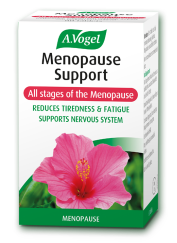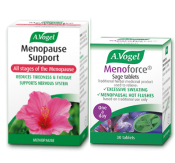Read the full video transcript below
Today's topic
Hello, and welcome to my weekly video blog. And today on A.Vogel Talks Menopause, I'm going to be talking about panic attacks.
These are another one of these really horrible menopause symptoms that can catch us totally unaware. They can start very suddenly. They can appear absolutely out of nowhere. And they are really, really horrible because when you're in the midst of a panic attack, it's very difficult to try and control them and to do anything at all.
What causes panic attacks during menopause?

So how do these happen? In most instances, what's happening is, is your oestrogen is falling. This is affecting your nervous system.
Your nervous system becomes much more jumpy and much more sensitive to external stimuli that maybe a short while ago you wouldn't even have noticed. Your nervous system starts to make up imaginary dangers, life-or-death situations, and that puts your nervous system in a total spin. You get a huge shot of adrenaline, and you end up with a full-blown panic attack.
What can trigger a panic attack during menopause?
Anxiety/stressful situations
Now, the main triggers are anxiety and stressful situations just by themselves, and I know a lot of women, especially if you're in high-powered jobs or if you've got a lot of rushing about to do and a lot on your plate, then these panic attacks can start to kick in just because you're worrying about day-to-day situations and all the things that you have to fit in to your day.
Hot flushes
It can be hot flushes and it's quite interesting that hot flushes can be linked to panic attacks. Sometimes, you'll get the panic attack first and then a hot flush comes along, or sometimes, you get the hot flush and then the panic attack. And these are both connected to the nervous system as well.
Poor sleep
It can be poor sleep, and you know, very often, sleep is a big issue in the menopause.
If you're not getting a good night's sleep, you're going to be far more tired and your nervous system is going to be much more jumpy every single day.
Dehydration
It can be dehydration, and this is a big one because dehydration can happen right through the menopause for all sorts of different reasons. And this one can be quite a big contributory factor.
Low Blood Sugar
It can be low blood sugars. And we know that our blood sugar control can go all over the place in the menopause and that will make it much more likely for your nervous system to then be triggered because your blood sugars are dropping just that little bit too low.
Lifestyle factors
It can be general lifestyle. If we're drinking too much coffee, drinking too much alcohol, smoking, just not looking after ourselves, and not having enough rest and relaxation.
So you can see the picture that is really typical when you start to get panic attacks and as I said, it's just part of day-to-day life. This is a common situation that a lot of us can find ourselves in.
What are the signs of a panic attack?
Now, the main signs of a panic attack has a whole different combination, so you're not necessarily going to get these and there's lots of other ones as well.
You will find that your heart can start to race. It can start to get very irregular. You can find your mouth getting very, very dry. You can start to sweat. You can start to tremble. You might find that your breath is coming very quick, and fast, and very shallow, or you might find that you can't actually catch your breath.
You might find that you start to get nauseous. You can get very dizzy. You can suddenly start to get tingling feelings in your fingers. Your ears can start to ring. And you can get this terrible feeling of fear that you just don't know where it's coming from.
How long can a panic attack last?
For how long does a panic attack last? They're normally about between 5 to 20 minutes. It's unlikely to last any longer because your panic attack is driven by the rush of adrenaline and there's only so much that your body can pump out at any given time, so normally they wouldn't last any longer than that.
What isn’t normal?
Now, what's not going to be a normal panic attack although there's nothing really normal about them anyway. All I would say here is that if you are getting panic attacks every single day, if they're coming from absolutely nowhere and you really have no idea, if you're starting to get really ill with them, if they are affecting your daily life and I know for some women, it gets to the point that the panic attacks become so bad that they can't leave their house, so if any of this is happening, this is the point when you go to the doctor because you probably will need some kind of help or medication just to help you get over this particular hurdle.
How to calm down during a panic attack?
So what can you do if you're in the midst of a panic attack? It is very difficult, but there are a couple of little, sort of, strategies that you can learn that might help you to cope just that little bit better.
1. Slow, deep breathing
One of the best ones is just to do really slow, deep breathing. This is a good one to practice every single day because slow, deep breathing can stop things like flushes as well, so it's a nice technique to have on a daily basis to help with all sorts of different menopause symptoms.
And this is when you practice maybe two or three times every single day, and very often, just the deep, slow, breathing will help to calm your nervous system down and shorten the duration of a panic attack.
2. Talk yourself through it
The other good one is to realise that these feelings are not real. Remember, this is your nervous system creating fears, creating a life-or-death or flight-or-fight situation, and there's nothing bad is going to happen.
It's just, unfortunately, our nervous system runs away with it. So if you find that you're in a panic attack, just saying to yourself, "This is going to end. It's not real. There's no danger. I'm not in any danger. In 5 or 10 minutes, I'm going to be absolutely fine." Again, that calming effect will help to speed up the whole process.
3. Close your eyes or find a focus point
You can close your eyes. Some people find that if they close their eyes and just focus on that and their breathing, then the panic attack can subside quite nicely. Other people find that if they focus on something in the room or wherever they are, so say for instance that there's a clock in front of you, you would put your whole focus on the clock, notice all the numbers, use as many senses as you can whilst you're doing this, and that then blocks all these panic attack thoughts that are entering your head, and you're creating a nice, calm environment for your body just to step into.
4. Let your imagination calm you
Another nice one again, takes a little bit of practice, but this is one of my favourite ones, is just to imagine either a really safe place, a beautiful place, you know, just think you're down by the beach, or you're relaxing in your back garden, or you're somewhere where it's nice and warm, so pick a favourite place, somewhere where you know you're always happy and relaxed, and just start to imagine that in your mind, and again, that can really help to calm your nervous system down as well.
5. Smell some lavender oil
Lavender oil is a nice one. If you find that these panic attacks tend to happen when you're out and about, and you don't want to suddenly stand in the middle of the street staring at something into the distance, a little bottle of lavender oil in your bag and just take it out and have a good few deep breaths.
Lavender is lovely for physically calming down your nervous system. The other thing that you can learn is something called EFT or tapping. And this is a series of movements where you tap different parts of the body. And again, it's helping to calm your nervous system down.
And it's helping you to focus on something other than all the panicky thoughts that are racing through your head at this particular minute.
How to prevent panic attacks
What to do to prevent panic attacks. It's not an easy one because your nervous system has a mind of its own, and even something really simple like not being able to find your car keys before you go out to work could set up a full-blown panic attack.
Do your breathing exercises every day
But there are things you can do to minimise the risk of this happening and that is one, remember your deep breathing. Practice it every single day.
Exercise regularly
You can get regular exercise. That gives you a really good, feel-good factor and it helps to strengthen your nervous system, strengthen your body generally.
Keep your blood sugars stable
Eat regularly, keep your blood sugars stable, so this is three good meals and also look at having good snacks in between.
Avoid becoming dehydrated
Stay hydrated. Remember the water, very, very important.
 Consider taking calming herbs & supplements
Consider taking calming herbs & supplements
You can look at herbs and supplements. We've got our lovely AvenaCalm for calming the nervous system. Remember the magnesium. Remember your B vits as well.
Keep a diary to pinpoint panic attack triggers
And one other thing is do the diary. If you're getting panic attacks regularly, write down everything that you're eating, and drinking, and doing during the day. And you might find that the panic attack tends to come at the same time every day, or the same time after you do or don't do something. So you may find you get a panic attack after a really strong cup of coffee, or you might find that you get panic attacks mid-afternoon purely because you've forgotten to eat your lunch.
So doing the diary is a really good little tip to try and pinpoint when you're getting the panic attacks so that in future you can prevent them from happening. So this is a really big one. It takes quite a lot of hard work, but you can definitely do it.
For those of you out there who maybe get panic attacks, do you have a favourite strategy? Maybe one I've not mentioned that you would like to share with everyone else and that would be absolutely great. And remember to put your comments in the section below the video here.
So I'll look forward to seeing you next week, for another edition of A.Vogel Talks Menopause.









